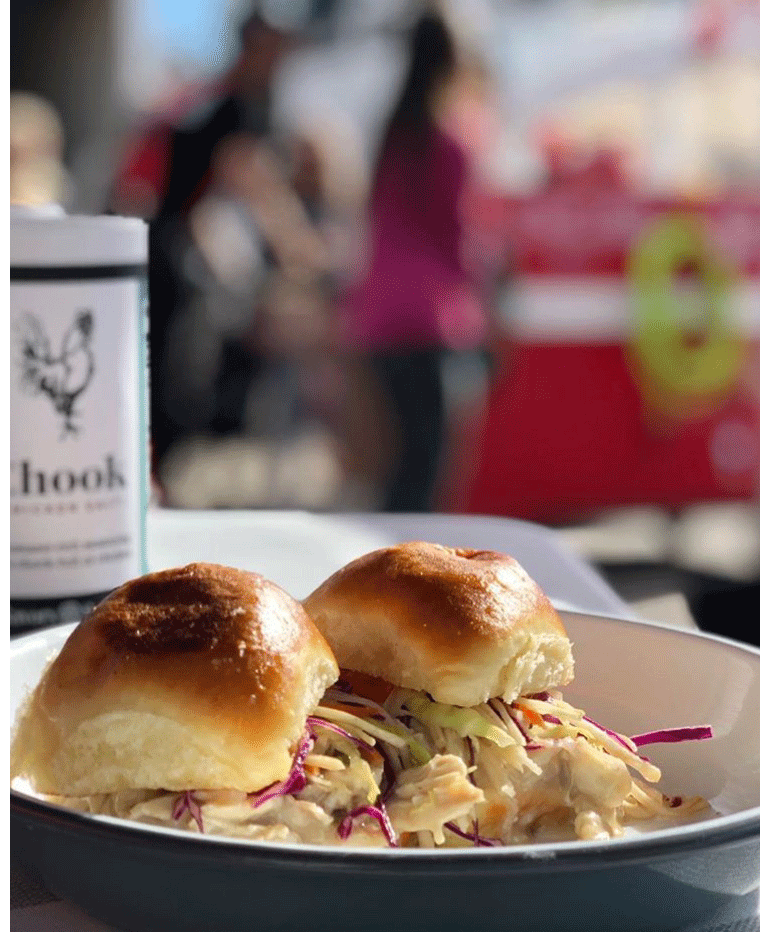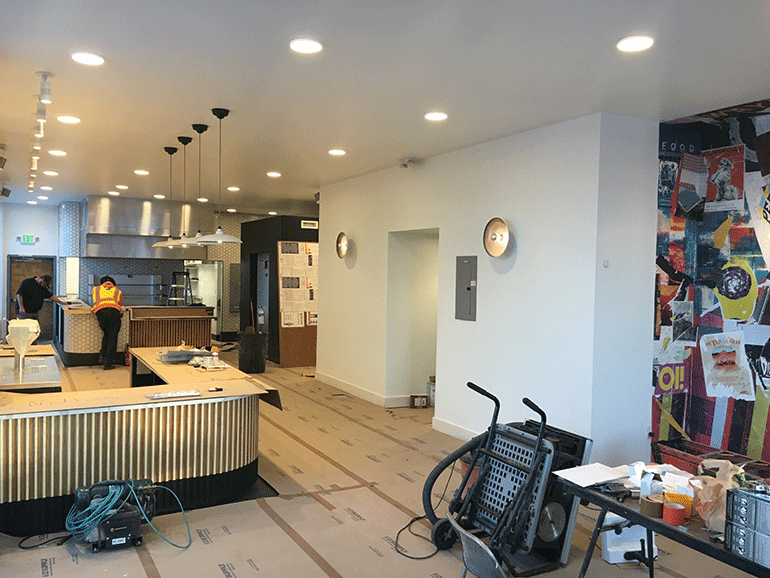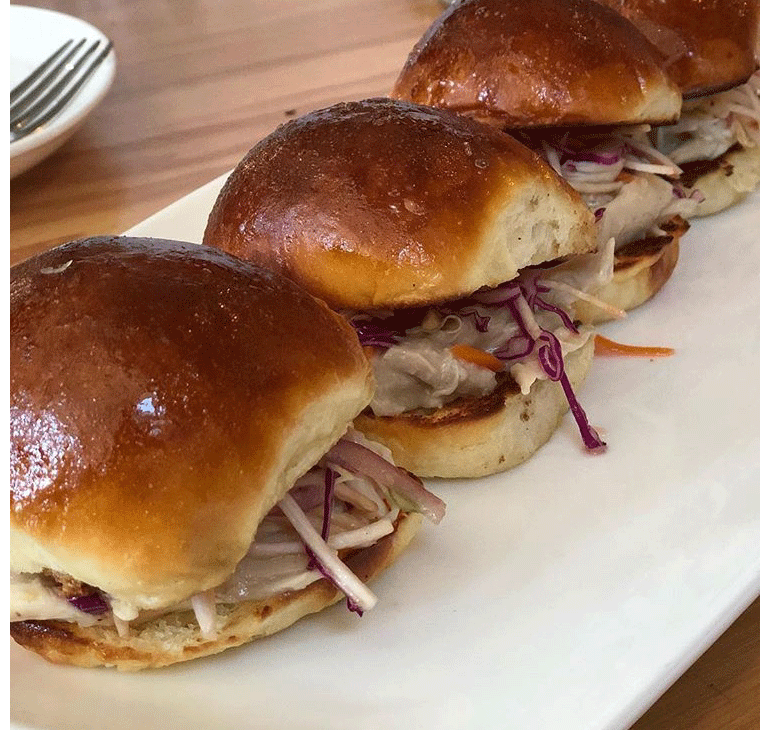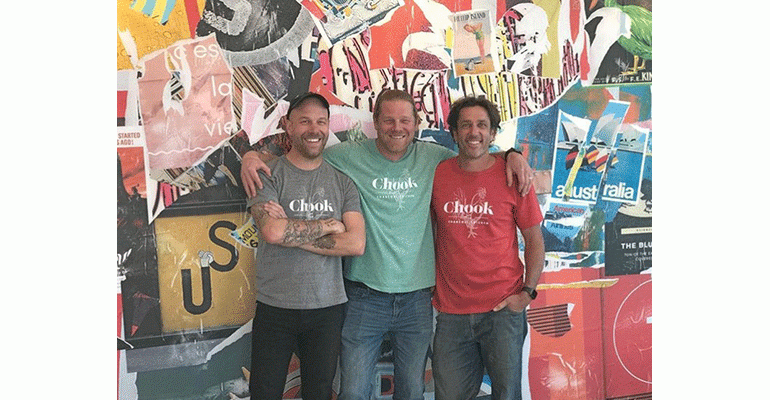Fine-dining chef Alex Seidel is teaming up with Snooze breakfast chain co-founder Adam Schlegel to launch a new rotisserie chicken concept in Denver called Chook Charcoal Chicken.
Scheduled to open Dec. 7, the Australian-style chicken concept is a first step into the competitive fast-casual space for both operators.
Named the best chef in the southwest this year by the James Beard Foundation for his restaurant and market Mercantile Dining & Provisions, Seidel is also known for his restaurant Fruition and his Fruition Farm, which produces artisan sheep’s milk cheese.
Schlegel launched casual-dining concept Snooze in 2006 with his brother, and the brand now boasts about 30 units in four states.
The two Denver-based operators said they have threatened to work together for years — Schlegel is a partner in Seidel’s farm and baked goods commissary — but that plan solidified with the birth of Chook, which was inspired by the neighborhood chicken shops of Australia.
“It really stems from my time down in Australia. My wife is from Melbourne,” said Schlegel. Living there, he came to rely on local takeout joints where chickens are roasted on spits over charcoal and served as whole, half or quarter birds with delicious sides and salads.
“If I’d be running late, and my family needed food, that’s where I’d go to get them something nutritious and delicious,” he said.

After returning to the U.S., Schlegel wanted to recreate that community-based concept that so perfectly fit the needs of busy families, but the ubiquitous grocery-store rotisserie chickens just didn’t compare.
Seidel, meanwhile, was eager to prove the type of food he was known for — locally sourced, sustainably raised, quality ingredients — could be made more affordable.
“So when Adam brought this to me, our conversation developed into something greater than being a chicken shop,” said Seidel. “I sit on panels all the time talking about farming and food access and sustainability, and I’ve always had a bit of a pit in my stomach because not everyone is fortunate enough to go to Mercantile.”
The two brought in a third partner, veteran barman Randy Layman, formerly of local restaurant Steuben’s, and took a three-day trip to Australia.
“We spent more time in the air than we did on the ground,” said Seidel.
The result is Chook, which means “chicken” in Australian lingo, a concept where a family of four can dine in or take out a feast made with the same care as Seidel’s fine-dining concepts for less than $40. A half chicken will be priced about $13, for example, with shareable sides around $4 to $5.

Key to the concept is the chicken itself.
The partners found an Amish farm in Indiana that meets the Global Animal Partners, or GAP, animal welfare certification program, created in part by Whole Foods Market to ensure that meat is raised without antibiotics or hormones and meets certain standards.
“I struggled to find poultry systems in Colorado that live up to our expectations of what good chicken is,” said Seidel. “Colorado is well- known for lamb and beef, but the poultry industry just didn’t have the systems — the processing and hatcheries, the cold storage and distribution.”
Added Schlegel, “We’re trying to figure out a poultry industry just as much as trying to develop a restaurant concept.”
With Chook, the partners hope to do for Colorado poultry what Chipotle Mexican Grill did for pork, said Seidel.
But that will likely take time. It takes scale to create a model that would make it efficient for farmers to produce such proteins at an affordable price, but Seidel said they will work on a small scale with farmers to help them grow.
“We talked about being poultry farmers ourselves,” he said. “I don’t think it’s our first goal, but it wouldn’t be surprising to either of us.”

Sustainability is written into the brand’s DNA, with no artificial ingredients, composting and no single-use plastics. Even the charcoal is made from discarded coconut husks, which diverts the shells from landfills.
Everything cooked in the kitchen will be over the grill; there are no fryers, ovens or gas. Schlegel called it “caveman cooking.”
“The coal gives it a nice char that you can’t get with a gas grill,” said Seidel. “You get flavor, crispness and you also get a really nice caramelization of skin.”
Similar to the way he prepares chicken at Mercantile, Seidel brines the birds using a mirepoix and fresh herbs. But to make it more efficient — and potentially scalable — the brine has been reduced to a just-add-water base.
“Now you can open a spigot into a container and the brine is complete,” said Seidel. “I almost prefer our brine at Chook over the brine in the restaurants.”

On the menu will also be charred broccoli, carrots and cauliflower, which will also appear in various salads, along with traditional sides like macaroni and cheese, roasted potatoes and cheese from Fruition Farms.
Chook will also offer chicken sliders made with “Pacific rolls,” or Chook’s version of Hawaiian rolls without the preservatives, and dishes like chicken salad made with Seidel’s sheep milk yogurt, or Sheepskyr.
A unique twist to the concept is Booyah, a classic chicken stew made in coal-fired cauldrons that is a favorite in the northern Midwest. Wisconsin native Seidel picked it up from going to Green Bay Packers games.
The restaurant will sell Booyah kits for $10 that will include greens, vegetables and a side of chicken stock to create an easy soup with any leftovers for the next day.
Not surprisingly, given Snooze helped drive the booze-at-breakfast trend, Chook will serve beer and wine on tap. The wine is from Attimo, a winery Schlegel’s brother Jon Schlegel is developing.
Also on the menu will be pre-mixed five-ounce classic cocktails they call Happy Pots.
“So our 18-year-old working the cash register will be able to pour the perfect dirty martini,” said Schlegel.
Alcohol will be for dine-in only. Schlegel said they are expecting to do about 50 percent of sales in takeout out of the 1,500-square-foot restaurant.
Guests can order and pay online and there will be designated parking spots for quick pick-up with food run to cars so parents don’t have to pull kids out of car seats.
Delivery, using compostable containers, is coming early next year, though Schlegel said they haven’t determine yet how — maybe by tuk tuk, though it’s hard to tell whether he’s joking.
“My gut is to do delivery internally, but there are so many new partners and programs,” he said. “But, being in the full-service business and knowing our style, I’d hate to see that end when we hand over that bag for delivery.”
Contact Lisa Jennings at [email protected]
Follow her on Twitter: @livetodineout





